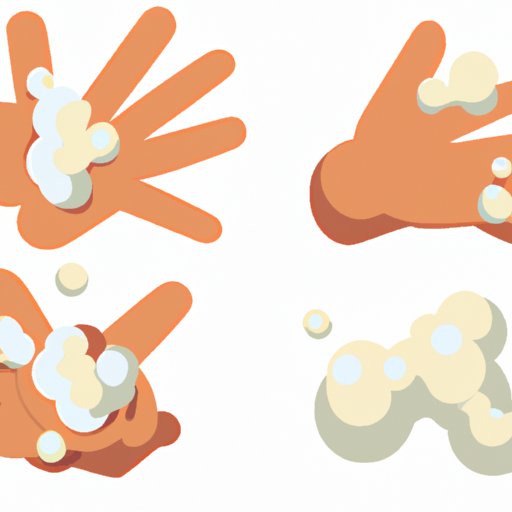
I. Introduction
Handwashing is one of the easiest ways to prevent the spread of germs and bacteria. Proper hand hygiene is a simple yet effective way to reduce your risk of getting sick and spreading illness to others. In this article, we will explore the importance of handwashing and provide guidelines, tips, and helpful information on how long you should scrub with soap when washing your hands.
II. Understanding Soap and Washing
Soap works by breaking up dirt and oil on our skin and removing it when we rinse our hands. When we wash our hands, it’s important to remember to scrub thoroughly to remove the germs and bacteria that can make us sick. Even though soap can effectively kill and remove germs, you still need to scrub long enough to make sure all the germs are gone.
Not using enough soap or not scrubbing long enough can leave some germs behind, which can cause illness and disease. Germs can easily spread and multiply, so it’s essential to wash our hands properly to prevent them from spreading.
III. The Duration of Handwashing
The Centers for Disease Control and Prevention (CDC) recommends washing your hands for at least 20 seconds. Singing or humming the “Happy Birthday” song twice is a useful way to time your handwashing and ensure you’re scrubbing for at least the recommended duration.
You may wonder what happens if you don’t wash your hands for the recommended duration. Studies show that washing your hands for less than 15 seconds is not enough to kill and remove all germs and bacteria. Even if you use soap, washing your hands for a shorter duration can still leave behind germs. On the other hand, washing your hands for longer than 30 seconds is not necessary and might dry out your skin excessively.
IV. The Significance of Timing
The duration of washing your hands is crucial. Studies have shown that washing your hands for at least 20 seconds is more effective at removing germs and bacteria from your skin. Shorter handwashing duration can leave behind residual germs, and longer washing times can lead to irritation and dryness of the skin.
Not washing your hands for the recommended duration can increase your risk of spreading germs, leading to infections, illnesses, and disease outbreaks. Proper hand hygiene, including scrubbing with soap for at least 20 seconds, is essential in protecting your health and the health of those around you.
V. Tips for Proper Handwashing
Following the proper steps for handwashing can help ensure that you remove all germs from your hands. Here’s what to do:
- Wet your hands with clean, running water, and apply soap.
- Rub your hands together to lather the soap, including the backs of your hands, between your fingers, and under your nails.
- Scrub your hands for at least 20 seconds. Use the “Happy Birthday” song twice to ensure you’re scrubbing long enough.
- Rinse your hands well under running water.
- Dry your hands using a clean towel or air-dry your hands.
It’s essential to make sure you’re using enough soap and scrub long enough to remove all germs and bacteria from your hands. Always wash your hands before and after preparing and eating food, after using the restroom, after handling garbage, after blowing your nose, coughing, or sneezing, and after touching animals or people with illnesses.
VI. The Best Way to Promote Good Handwashing
Organizations and individuals can play a significant role in promoting good hand hygiene. Here are some successful strategies:
- Lead by example: Wash your hands regularly and for the recommended duration.
- Provide handwashing supplies: Make sure there are enough soap and water, hand sanitizers, paper towels, and trash cans available in your workplace, school, or home.
- Post reminders: Use posters, signs, or messages to remind people about the importance of handwashing, and how to wash their hands properly.
- Include hand hygiene in your education: Teach children, patients, and employees the importance of hand hygiene and how to wash their hands properly.
VII. Conclusion
In conclusion, washing your hands with soap and water for at least 20 seconds is crucial in reducing your risk of getting sick and spreading germs. Proper hand hygiene is essential to protect your health and the health of those around you. By following guidelines, gauging the proper duration, and using tips and reminders for effective handwashing, you can help prevent illness and disease outbreaks.
Remember, good hand hygiene starts with you, and together we can help ensure the health and safety of our communities.





